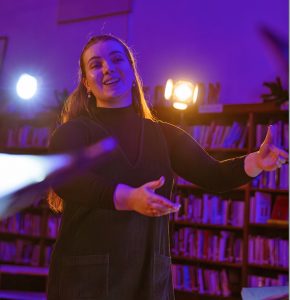Before Christmas, conductor Emma Warren and her choir Inchant performed Stephen Dodgson’s The Running Carol and Falan-Tiding in the unusual setting of grade 2-listed Belsize Community Library, amid bookshelves and beanbags – a cosy ambience which aimed to attract new audiences and introduce them to a variety of music.
Both Dodgson pieces were new discoveries for the group, and Emma describes them below:
Discovering Dodgson
 I first came across Stephen Dodgson’s choral music at the Barnes Music Festival in March 2023. The launch event for the Stephen Dodgson International Choral Project featured three different choirs, both professional and amateur, who sang a selection of his choral music throughout the evening. The programme was varied, with music for several different combinations of voices, both a cappella and accompanied (one set, Home-Bred Pictures, by harp and another, Four Poems of Mary Coleridge, unusually by flute). After the concert, I had a look through Dodgson’s catalogue of choral works and made a mental note to try and include some of his music in my upcoming programming.
I first came across Stephen Dodgson’s choral music at the Barnes Music Festival in March 2023. The launch event for the Stephen Dodgson International Choral Project featured three different choirs, both professional and amateur, who sang a selection of his choral music throughout the evening. The programme was varied, with music for several different combinations of voices, both a cappella and accompanied (one set, Home-Bred Pictures, by harp and another, Four Poems of Mary Coleridge, unusually by flute). After the concert, I had a look through Dodgson’s catalogue of choral works and made a mental note to try and include some of his music in my upcoming programming.
A few months later, I started my role as Meaker Fellow at the Royal Academy of Music, and set about planning the first concert of my year-long project with my young professional chamber choir, Inchant. One of my aims for the year was to expand my knowledge of repertoire for upper-voice choir, and to conduct works that I hadn’t done before. Stephen Dodgson’s choral works certainly fit this brief! They were all new to me, and his anniversary celebrations as part of the International Choral Project gave me the perfect reason to include them in my Christmas concert programme. I’m very glad that we now have two of his choral works in our repertoire: The Running Carol and Falan-Tiding.
The Running Carol
As I flicked through the upper-voice works in Dodgson’s catalogue, The Running Carol was the first to catch my eye. I’m always on the lookout for exciting, upbeat choral pieces – there is so much beautiful, reflective music out there – but finding contrasting repertoire for a cappella choirs can sometimes be difficult. This piece provided a high-energy break in the middle of an otherwise slow and tranquil a cappella choral set.
The Running Carol is No.4 in Stephen Dodgson’s ‘A Christmas Collection’, and is scored for two equal soprano voice parts. I decided to boost numbers by including a mezzo-soprano on each line, as I was working with a very small group. Dodgson sets a text by William Drummond (1585–1649), depicting the shepherds rushing to Bethlehem to see the newborn baby Jesus. The piece is packed full of word painting, and the ‘Vivace’ tempo marking highlights the sense of urgency.
The Running Carol certainly challenged the choir to begin with. Dodgson’s interweaving melodic lines can be unpredictable at times, with some angular leaps to navigate. The piece had never been recorded, which added an extra level of challenge to our preparation. After a few rehearsals, we started to feel much more comfortable with the music, and it was very satisfying getting to grips with the piece.
It also turned out to be a huge ‘earworm’. The singers and I were humming excerpts in all of our rehearsal breaks, and after the concert several audience members told me that it was their favourite piece of the programme – the one that they really remembered.
When I asked the choir what they thought of The Running Carol, one sentiment came up again and again: ‘It was so much fun to sing.’ My favourite comment came from one of the singers who had been listening back to our recording as she rushed to the tube station, late for a rehearsal. Apparently it really helped!
Falan-Tiding
Our rehearsal time for this concert was already weighted towards several more demanding contemporary pieces, so Dodgson’s arrangement of Falan-Tiding was an ideal addition as a straight-forward, effective programme filler.
The text dates back to the 17th century, and is also known by the first line ‘Out of the Orient Crystal Skies’. Dodgson’s simple setting maintains the strophic structure of the hymn, allowing the poetry to take centre stage.
This arrangement works for any combination of voices. The choir sings the traditional melody in unison, with ‘a few voices’ adding Dodgson’s own descant part in verses two and three. The simplicity means it is very quick to put together and polish on minimal rehearsal time – a choral conductor’s dream!
We are very grateful to the Stephen Dodgson Charitable Trust for helping us to find suitable repertoire, providing us with licence-free scores, and for supporting our concert.
Emma Warren
Artistic Director, Inchant / Meaker Fellow, Royal Academy of Music





